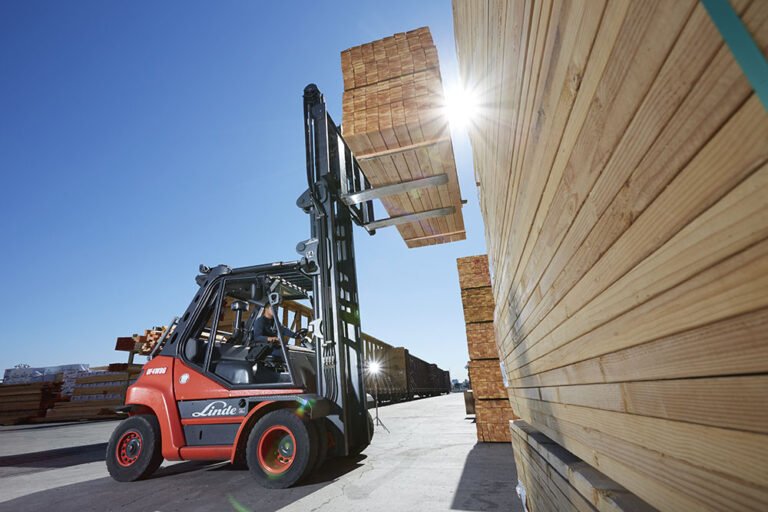Operating forklifts outdoors presents unique challenges and safety concerns. Ensuring safe and efficient forklift operation in outdoor environments is crucial for preventing accidents and maintaining productivity. At Toyota Material Handling Australia, we offer a wide range of reliable forklifts for sale, designed to handle various outdoor conditions. Here are essential safety tips for outdoor forklift operation to help you maintain a safe and effective work environment.
Conduct a Thorough Pre-Operation Inspection
Check Tire Condition: Inspect the tires for wear, damage, and proper inflation. Outdoor surfaces can be uneven and rough, so having tires in good condition is essential for stability and safety.
Inspect Lights and Signals: Ensure all lights, indicators, and warning signals are functioning correctly. Good visibility is crucial for safe operation, especially in low-light conditions or inclement weather.
Verify Fluid Levels: Check all fluid levels, including engine oil, hydraulic fluid, and coolant. Proper fluid levels are necessary for optimal forklift performance and to prevent mechanical failures.
Ensure Proper Training and Certification
Qualified Operators: Only trained and certified operators should handle forklifts. Proper training ensures operators understand the specific challenges of outdoor operation and can handle the equipment safely.
Refresher Courses: Regularly schedule refresher courses for your operators to keep their skills and knowledge up to date. This is especially important for adapting to new equipment or changing outdoor conditions.
Adapt to Weather Conditions
Wet and Slippery Surfaces: Outdoor surfaces can become slippery when wet. Reduce speed and increase following distance to allow for safe stopping. Use forklifts with tires designed for better traction on wet surfaces.
Wind and Visibility: High winds and poor visibility can pose significant hazards. Avoid operating forklifts in extreme weather conditions and ensure operators have clear visibility at all times.
Cold Weather Operation: In cold weather, allow the forklift to warm up before operation to ensure optimal performance. Check for ice and snow buildup on the forklift and work surfaces, and use appropriate de-icing products.
Navigate Uneven Terrain Safely
Avoid Hazardous Areas: Identify and avoid areas with significant hazards such as deep potholes, loose gravel, or unstable ground. Mark these areas clearly to prevent accidental entry.
Adjust Speed: Operate the forklift at a reduced speed on uneven or rough terrain to maintain control and stability. Sudden movements or high speeds can lead to tipping or loss of control.
Use Appropriate Equipment: Select forklifts designed for outdoor use, with features like higher ground clearance, durable tires, and robust construction. At Toyota Material Handling Australia, we offer forklifts specifically built to handle outdoor environments.
Load Handling and Stability
Proper Load Securing: Ensure all loads are properly secured and balanced before moving. Uneven loads can shift during transport, causing instability and increasing the risk of tipping.
Weight Limits: Adhere to the forklift’s weight limits to prevent overloading. Overloading can compromise the forklift’s stability and lead to accidents.
Visibility of Load: Maintain a clear view of the load and path ahead. If the load obstructs your view, operate the forklift in reverse or use a spotter to guide you.
Maintain Clear Communication
Use Signals: Establish clear hand signals or use two-way radios to communicate with other workers on-site. Effective communication helps coordinate movements and avoid accidents.
Warning Alarms: Ensure the forklift’s horn and other warning alarms are functional. Use them to alert others of the forklift’s presence, especially in busy or noisy outdoor environments.
Regular Maintenance and Inspection
Scheduled Maintenance: Adhere to a regular maintenance schedule to keep the forklift in optimal condition. Routine maintenance helps identify and address potential issues before they become safety hazards.
Document Inspections: Keep detailed records of all inspections and maintenance activities. This documentation ensures compliance with safety regulations and provides a history of the forklift’s condition.
Safe outdoor forklift operation requires careful preparation, proper training, and adherence to best practices. By following these safety tips, you can ensure a safer and more productive work environment. At Toyota Material Handling Australia, we provide high-quality forklifts for sale, designed to handle the challenges of outdoor operation. Visit our website or contact us today to explore our range and find the perfect forklift for your needs. Prioritise safety and efficiency in your outdoor operations with reliable equipment and expert guidance.
Passionate content writer and savvy blog publisher, Aamir crafts compelling stories and insightful articles that captivate and inform. With a knack for blending creativity and strategy, they bring fresh perspectives to every piece. Dive into their world of words and discover content that resonates.





